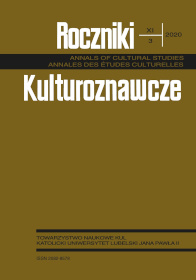Covid-19 and the Future of Western Civilisation
Abstract
Civilisation is in many ways the apotheosis of the human social impulse, good and bad, and, whatever happens, the Age of Coronavirus is going to shape the western version of this shared culture profoundly. This article reviews the way in which human sociality has shaped human disease and vice-versa and offers three idealised possible futures for Western Civilisation that Covid-19 might produce.
References
Barnes, Ethne. Diseases and Human Evolution. Albuquerque: University of New Mexico Press, 2005.
Blevins, Steve M., and Michael S. Bronze. “Robert Koch and the ‘Golden Age’ of Bacteriology.” International Journal of Infectious Diseases 14 (2010), issue 9: e744-e751. DOI: https://doi.org/10.1016/j.ijid.2009.12.003.
Burgess, Katie. “National Cabinet rejects elimination strategy.” Canberra Times. July 24, 2020
Collinge, Sharon, and Chris Ray. Disease Ecology: Community Structure and Pathogen Dynamics. Oxford: Oxford University Press, 2006.
Davis, Mike. Late Victorian Holocausts: El Niño Famines and the Making of the Third World. London & Brooklyn, NY: Verso Books, 2002.
Dubos, René Jules. Mirage of Health: Utopias, Progress and Biological Change. New Brunswick, NJ: Rutgers University Press, 1987.
Elias, Norbert. “Technization and Civilization.” Theory, Culture & Society 12 (1995), issue 3 : 7–42. DOI: https://doi.org/10.1177/026327695012003002
Elias, Norbert. The Civilizing Process. Sociogenetic and Psychogenetic Investigations. Revised edition. Oxford: Blackwell, 2000.
Freud, Sigmund. Civilization and its Discontents. Translated by James Strachey. Peterborough: Broadview Press, 2015.
Hamlin, Christopher, and Pat Sidley. “Revolutions in public health: 1848, and 1998?” Bmj 317 (1998), no. 7158: 587–591.DOI: https://doi.org/10.1136/bmj.317.7158.587.
Harper, Kyle. The Fate of Rome: Climate, Disease and the End of an Empire. Princeton: Princeton University Press, 2017.
Huntington, Samuel. “The Clash of Civilizations?” Foreign Affairs 72.3 (Summer, 1993): 22–49.
Karlen, Arno. Plague’s Progress: A Social History of Disease. London: Gollancz, 1995.
Longmate, Norman. King Cholera: The Biography of a Disease. London: Hamish Hamilton, 1966.
McMichael, Anthony J. “Environmental and Social Influences on Emerging Infectious Diseases: Past, Present and Future.” Philosophical Transactions of the Royal Society of London. Series B: Biological Sciences 359 (2004), no. 1447: 1049–1058.
Pinker, Steven. The Better Angels of Our Nature: Why Violence has Declined. New York: Penguin Group USA, 2012.
Porta, Miquel (ed.). A Dictionary of Epidemiology (5th edition). Oxford: Oxford University Press, 2009.
Snowden, Frank. Epidemics and Society: From the Black Death to the Present. New Haven, CT: Yale University Press, 2019.
Stathakopoulos, Dionysios. Famine and Pestilence in the Late Roman and Early Byzantine Empire. Aldershot: Ashgate, 2004.
Summers, Jesse, and Samuel Litwin. “Examining the Theory of Error Catastrophe.” Journal of Virology 80 (2006), no 1: 20-6. DOI: 10.1128/JVI.80.1.20-26.2006
Torrey, E. Fuller, and Robert H. Yolken. Beasts of the Earth: Animals, Humans and Disease. New Brunswick, NJ: Rutgers University Press, 2005.
Watts, Sheldon. Epidemics and History. New Haven, CT: Yale University Press, 1997.





